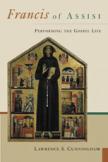A Doer of the Word
Lawrence S. Cunningham’s small study of St. Francis demonstrates the value of sound critical judgment and solid theology for grounding healthy devotion to the saints and deepening the faith in the Christian realities to which they dedicated themselves. In A Modest Foreword, Cunningham sets out his goals. He will mine the available historical information to subvert the sentimental stereotypes that have vitiated the image of Francis as a saint and a theologically important member of the Christian tradition. Further, he will place Francis within his own historical context to illuminate both his traditional character (in the best sense) and his genuine originality. Third, he offers his study of Francis as an example of how to read the saints as a resource for theological reflections.
Cunningham’s solid historical scholarship is omnipresent, although it is so smoothly and thoroughly integrated that the work is in no way pedantic, nor is there any trace of jargon or obfuscation. The author eschews footnotes in favor of a concluding bibliographical essay. He consistently notes and evaluates the textual evidence for Francis’s life, distinguishing between contemporary evaluations and later ones, between Francis’s own few writings and those of his admirers. And he discounts nothing, but chooses carefully.
In terms of context, Cunningham positions Francis carefully within his own times and the larger sweep of 12th-century reform movements, a horizontal contextualization. He also points out the ways in which Francis learned from the theological and ascetical tradition that preceded him, a vertical contextualization. Cunningham also listens with great care to the biblical resonance of Francis’s life and thought, another element of context that is critical to the proper understanding of the saints. All of these various contexts reveal the richness of Francis’s legacy, as Cunningham lays it out within a biographical framework.
Cunningham develops the major theological and ascetical themes of Francis’s life, the better-known themes, like Francis’s love of nature, and less well-known themes, like his devotion to the Eucharist. With regard to the former, Cunningham shows the relationship between Francis’s vision of creation and the scholastic teaching about the goodness and obedience of God’s creation, based in part on Aristotelian notions of causality. He also shows that Francis’s affirmation of creation can be seen as an indirect assault on the heresy of the Cathars, who proclaimed the sinfulness of the material world. The author suggests that the love of nature, seen in connection with frequent narratives of Francis stripping himself naked, demonstrates Francis’s commitment to a view of human existence as a return to the state of Eden, in which Adam lived in peaceful praise with all of God’s created world.
For Cunningham, all the strands of Francis’s life and work flow from his insight into the great mystery of the Incarnation, in which the second person of the Trinity empties himself completely in order to demonstrate God’s saving love for those God has created. This insight, Cunningham affirms, grounds Francis’s love of nature, his devotion to the feast of Christmas with its emphasis on the poverty and vulnerability of the infant Christ, his emphasis on the Eucharist as the sacrament of Christ’s humble service, as well as his commitment to the crucified Savior. Thus, he believes that an orthodox and powerful Christology unifies Francis’s life and makes his voluntary poverty not just a prophetic sign or an ascetical practice, but, as the author describes it, the primary way in which Francis performed his religious understanding. One could say that his life, and to a real extent, his body was a kind of exegesis of the scriptures and an attempt to live out the imitation of Christ. For Cunningham, therefore, the most important way to understand Francis is to see that he was more a performer of the Word of God than a commentator upon it.
This short review cannot begin to do justice to the many virtues of Cunningham’s work. Let me close on a personal note. I read the book in the days leading up to Ash Wednesday and, coincidentally, the opening of Mel Gibson’s movie on the passion of Christ. In that context, I found myself compelled by the way in which Francis’s commitment to the crucified Christ found expression, not in guilt but in joy and in song. Francis identified himself as a man of penance; he became a force for reconciliation, praise and joyful service.
One of Cunningham’s many strengths is that he holds in perfect balance the various polarities of Francis’s life: penance and joy, love of creation and absolute poverty, consonance with the tradition and genuine originality. Let us hope that in keeping with his third objective, other theologians begin to read the saints according to the model Cunningham has so felicitously offered.
This article also appeared in print, under the headline “A Doer of the Word,” in the April 5, 2004, issue.








